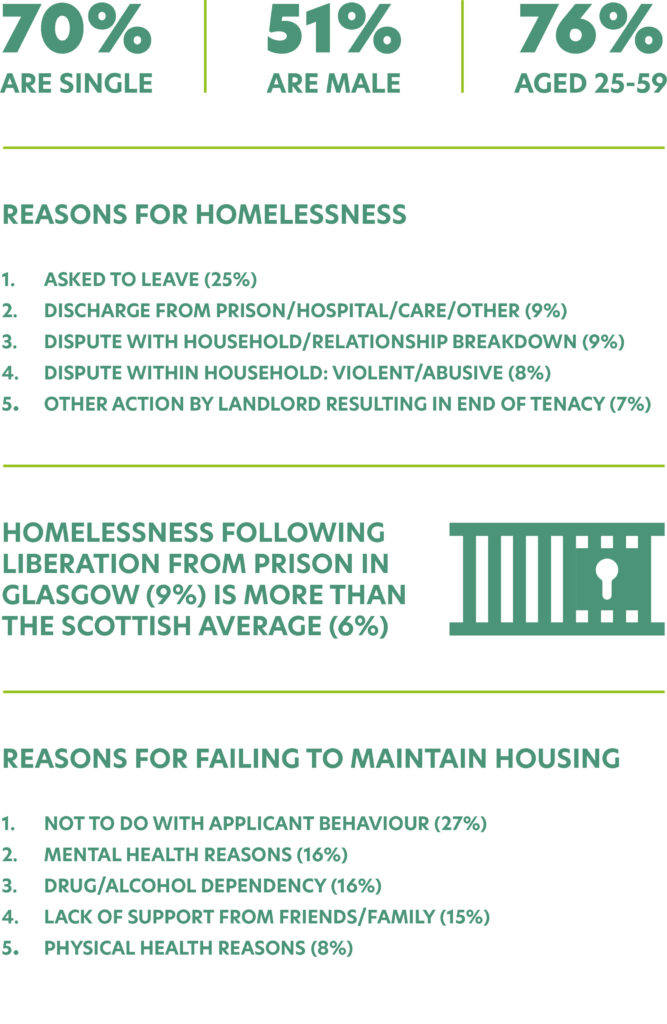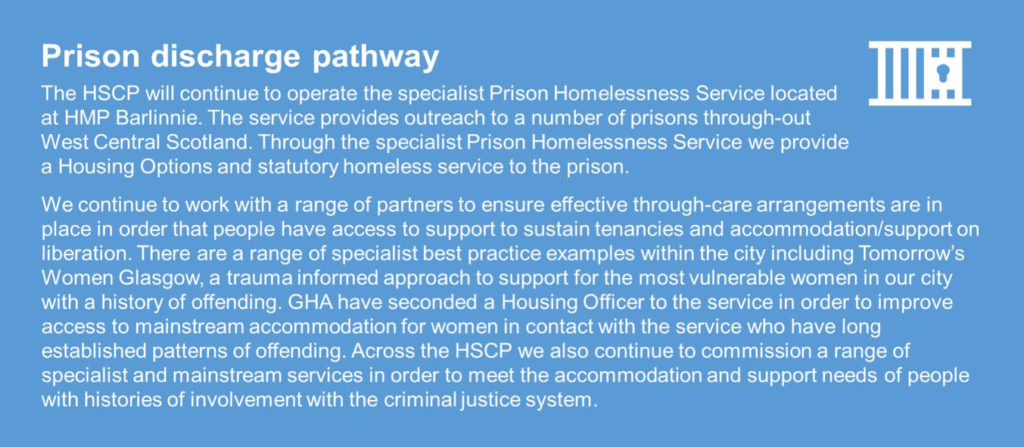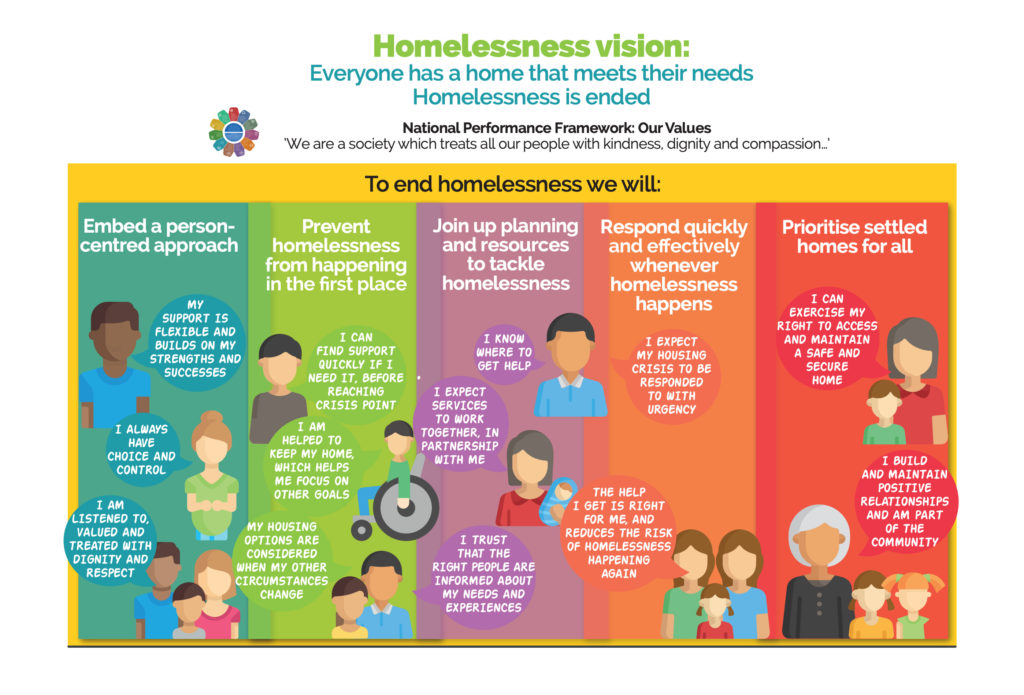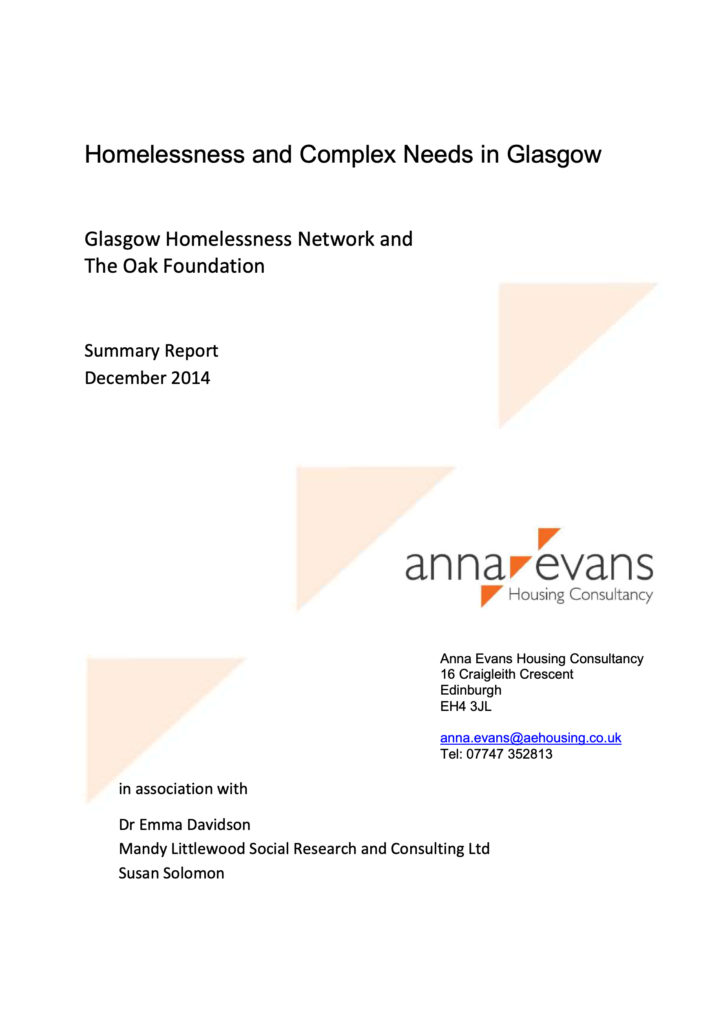Head of Homelessness, Glasgow City Health & Social Care Partnership (GCHSCP)
The Rapid Rehousing Transition Plan (RRTP) 2019/20 – 2023/24 for Glasgow sets out how partners in Glasgow will work together over the five years of the plan, to ending homelessness in Glasgow. The plan is underpinned by these principles:
- Work in partnership to prevent homelessness and where it does occur, we ensure that people access the right support at the right time.
- That secure housing enhances peoples’ life experiences. With the right support, most people are capable of sustaining settled housing in local communities.
- That time spent in temporary accommodation is kept to a minimum, with access to settled housing our main priority.
- People with lived experience of homelessness have unique and valuable insights and need to be involved in service development.
The plan is informed by Ending Homelessness Together: High Level Action Plan by the Scottish Government (CLICK ON THE LINK BELOW):
Rapid rehousing is a central pillar in the wider strategy to end homelessness in Glasgow and will take a central role in the wider strategy to develop services, partnerships and approaches to meeting the needs of homeless people in the City. This includes the plans to:
- improve the ways in which to manage demand for homeless services and access to settled housing; housing options and homelessness prevention;
- the upscaling of Housing First;
- boost the central role of housing support services in enabling effective tenancy sustainment;
- enable easy access to addiction recovery services that contribute to tenancy sustainment;
- meet the needs of the chronic City Centre homeless population including ending rough sleeping; and
- transform the provision of homelessness services in the City using the Alliance commissioning model – you can read about this in the article ‘AN ALLIANCE TO END HOMELESSNESS’.
The vision for rapid rehousing in Glasgow is:
To reduce the time spent in temporary accommodation by enabling homeless households to access settled accommodation quickly and with the right support to sustain their housing outcome.
The RRT objectives are:

To achieve these objectives, partners in Glasgow will:
- Reduce time in temporary accommodation by more than 50%
- Eradicate the use of bed and breakfast accommodation for homeless people
- Reduce the supply of temporary furnished flats by 1,000 units
- Reduce the supply of hostel provision by 500 units
- Develop the 600 Housing First tenancies for the City’s most complex and disadvantaged service users
- Invest savings in the delivery of person-centred floating support services
Achieving these will result in:
- Transformation of the experiences and outcomes achieved by homeless people in Glasgow
- Significant reductions in temporary accommodation and movement away from unsuitable accommodation
- A system change in the homeless commissioning model from accommodation based services to community based support services
- Net savings in public expenditure on homelessness of up to £70m.
This is particularly relevant to community justice, with around 9% of homelessness applications coming from people leaving prison and returning to Glasgow (although this has been reducing over time). The RRTP identifies that prison leavers are more likely to:
- make repeat Homeless Applications (135 cases, 29.6%),
- lose contact after the initial homelessness assessment (166 cases, 18%),
- and are less likely to have an outcome of a Scottish Secure Tenancy (87 cases, 18% of all prison leaver outcomes).
There has been a dedicated Prison Homelessness Casework Team based in Barlinnie Prison for many years, who work with people leaving prison and returning to Glasgow from across the whole prison estate. Prison leavers are therefore a key priority group within the Glasgow RRTP. Some additional information on Glasgow’s homeless population are shown below:

A study commissioned by Glasgow Homelessness Network (now Homelessness Network Scotland) estimated that:
- Between 1,500 and 1,800 people approached homelessness services with needs that could be defined as complex during 2013/14.
- The majority of these people were single men aged between 25 and 59 years.
- They include people with drug or alcohol problems, poor mental health, and involvement in the criminal justice system.
The review of homelessness services carried out as part of the RRTP also found that
“There is a group of service users with particularly complex needs whose lives are marked by transience, involvement in the criminal justice system, poor physical and mental health, and a general level of vulnerability. Their early life experiences can be punctuated by trauma; neglect; Child Sexual Abuse; poor educational attainment; and involvement with Social Work Services. Services also appear to struggle to engage and penetrate beyond the immediate challenges posed by this service user group. Despite considerable expenditure in this area, this group of service users have generally poorer outcomes across the range of health and wellbeing indicators than the general population. They are also likely to have poorer physical and mental well-being than suitably housed individuals with similar incomes.”
An early priority of the plan is to work with this group, integrating all of the services needed to fit with their needs, and improve their outcomes.
The RRTP prioritises a number of pathways, these are for veterans, care leavers, hospital discharges, domestic abuse pathways and also the prison leavers pathway. More detail on the prison pathway can be seen below:






